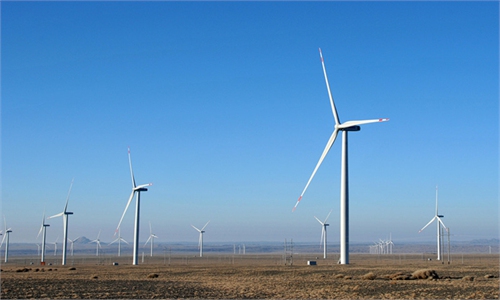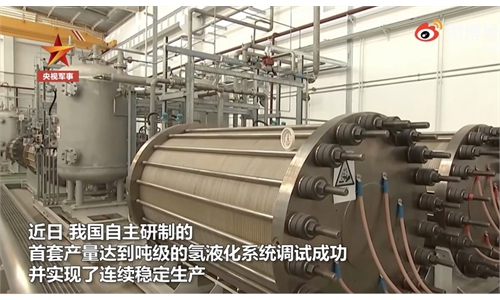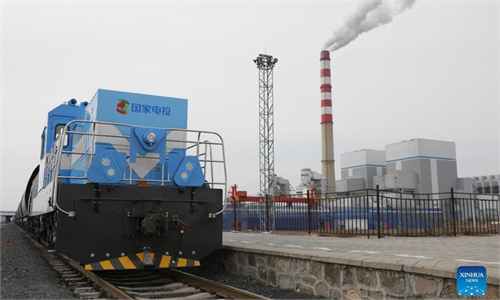Hydrogen cars to take off despite high costs, lack of infrastructure
Fueling the future
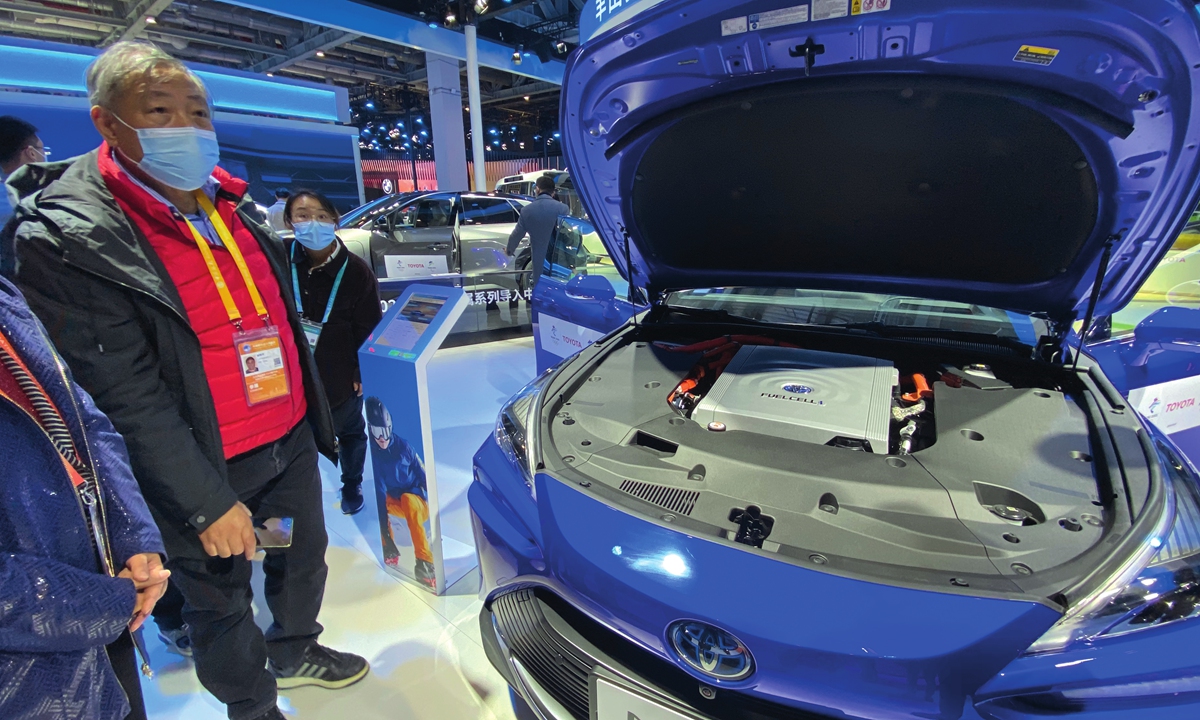
Toyota displays a hydrogen-powered vehicle at the 4th CIIE that will be used in the 2022 Winter Olympics. Photo: Xie Jun/GT
As electric car companies continue to grow rapidly in China, another type of new-energy vehicle (NEV) - hydrogen-powered vehicles, are also starting to join the race.
Alongside a silver-colored NEXO car at the Hyundai booth during the fourth China International Import Expo (CIIE), a representative from the South Korean car giant is besieged by all kinds of questions from a gathering crowd of onlookers. "How much is the car?" "What is the rationale behind hydrogen-fueled engine?" "Is hydrogen safe?" "When will Hyundai's hydrogen-fueled cars be sold in China?"
NEXO is one of the several hydrogen-fueled powered vehicles that Hyundai is displaying at this year's CIIE. The Global Times learned from the aforementioned representative, who asked not to be named, that Hyundai is planning to launch the car in China next year.
Hyundai is not alone in unveiling its hydrogen-powered car plans for the Chinese market.
In fact, hydrogen-powered cars have become one of many highlights within the 4th CIIE's car exhibition area which has always been dominated by electric cars in the past, with a number of companies, from car manufacturers to car parts providers, displaying their products and solutions about hydrogen vehicles at the expo.
Japanese automobile giant Toyota displayed its hydrogen-powered car Mirai, which will be used for transportation during the 2022 Beijing Winter Olympics. French multinational tire manufacturing company Michelin exhibited a hydrogen-powered racing car, while Germany-based industrial giant Bosch exhibited a hydrogen fuel engine module.
Zhao Jiamiao, who works for Bosch Powertrain Solutions, told the Global Times on the sidelines of the CIIE that the system has already entered small-scale production to equip some domestic clients, starting from freight vehicles.
The cars and solutions at the CIIE are being viewed by many as a dress rehearsal, but a signal has been clearly sent by those exhibitions - hydrogen-powered vehicles are finally starting to land and compete in domestic market after years of preparation and research into environmentally friendly fuel which can one day replace gasoline.
"Overseas firms had taken a wait-and-see attitude toward launching hydrogen cars in China in the past, but now they are making a firm step toward action. The 4th CIIE might represent an important inflection point in China's hydrogen vehicle development," veteran automobile industry observer Feng Shiming told the Global Times.
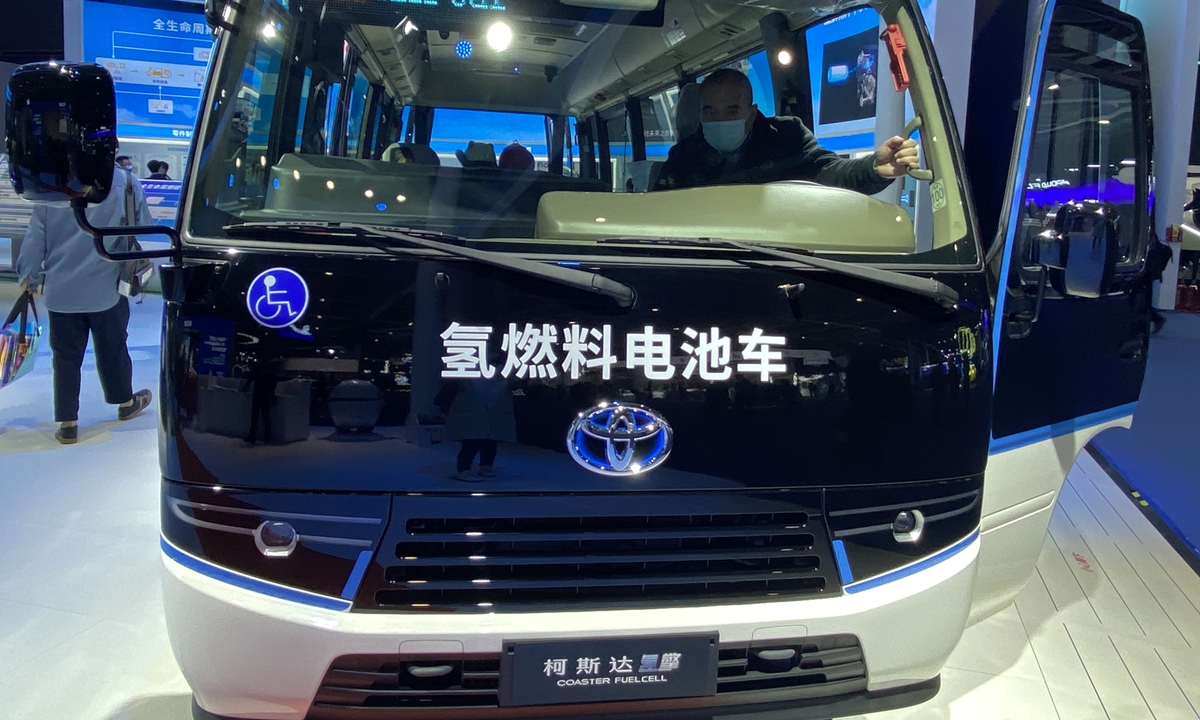
Toyota displays a hydrogen-powered vehicle at the 4th CIIE that will be used in the 2022 Winter Olympics. Photo: Xie Jun/GT
Scaling up
One important reason that has pushed corporates to make up their mind is the government's determined policy shift to clean energy, particularly after the setting of goals for achieving carbon neutrality and carbon emissions peak, experts and company employees said.
"There will be more and more efforts [for hydrogen car launches] over the next few years in China, as the government's carbon plans will push companies to move in this direction," Zhao said.
She emphasized that hydrogen is super clean energy as it only emits water, while automotive batteries could still cause some pollution to the soil, not to mention the carbon-creating gasoline.
The Global Times observed that some companies showed videos at the CIIE booth aimed at educating attendees about the working rationale behind hydrogen vehicles and educate them about the energy's environmental benefits.
Some firms are also showing confidence that their launch of hydrogen vehicles in China will be boosted by favorable policies. The aforementioned representative from Hyundai, for example, anticipated that hydrogen cars might receive subsidies from the Chinese government when they launch in China.
"Because it is an environmentally friendly car, NEXO might get support from the Chinese government," she said. "Hyundai has not yet decided the car's price in China. But taking its South Korean version as reference, it might cost around 220,000 yuan ($34,430) eventually after government subsidies."
According to Feng, it should be without doubt that overseas firms have locked into signals from Beijing's carbon reduction policies, and the use of hydrogen vehicles during the upcoming Winter Olympics.
"From all sides, from policymakers to the industrial players, they have reached a level of consensus on promoting hydrogen cars in China," Feng said.
On Sunday, the State Council, China's cabinet, published guidelines on preventing and controlling pollution. The document stressed that China will support the application of hydrogen-powered vehicles.
Qi Haishen, president of the Beijing The Solar Tech Co, said that judging from China's current hydrogen car promotion models in several city clusters as well as technology levels, hydrogen power will first be deployed for public vehicles and light to medium weight trucks, which will be suitable to install medium or small-capacity fuel battery systems.
"With the help of government policies, high-power fuel cells are developing fast in China. The era of '10,000 hydrogen cars' will come soon in China, as about 10,000 hydrogen-powered vehicles will be sold annually around 2025," Qi told the Global Times on Tuesday.
Uncertainty lingers
However, experts are not very certain that hydrogen vehicles can be easily adopted by the public, as the power has some disadvantages or inconveniences that companies have to solve if they want to sell the vehicles on a large scale in China.
For one thing, unlike electric cars, hydrogen vehicles lack existing infrastructure, which means that they have to build necessary hydrogenation infrastructure from the scratch, posing a challenging task.
An equally difficult task is how to decide the speed of building such as an infrastructure system. "If hydrogenation equipment is built too fast, many might be wasted as there will not be many hydrogen car users at first, and the cost will be high. If too slow, drivers will complain about inconvenience of fueling their cars," Feng said.
According to Feng, it has taken electric car companies about 10 years to find out an appropriate mode of building their auxiliary network, and it could take another 10 years for hydrogen vehicle companies to find their own.
The Hyundai representative at the CIIE said that although there is not much hydrogenation equipment now, it will gradually increase in number, just like the shift from 4G to 5G network.
Another disadvantage of hydrogen vehicles is that the typical size of vehicles will be larger than electric cars, as hydrogen vehicles' power system is more complicated than existing battery technology, including its hydrogen storage tank, fuel battery engine and auxiliary battery, economist Song Qinghui told the Global Times on Tuesday.
Cost may come as another obstacle, as the production cost of hydrogen cells more than doubled that of lithium batteries mainly because of its limited application. "This, plus the current shortcomings in hydrogenation equipment, will put the entire purchasing cost and hydrogenation cost at a relatively high level. This means the market's starting point still needs policy encouragement and support," Qi said.
Feng said that he holds a neutral viewpoint on the market prospects of hydrogen cars.
"I still have some question marks, but I am happy to see the market's growth in the future," he said.

